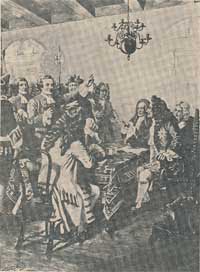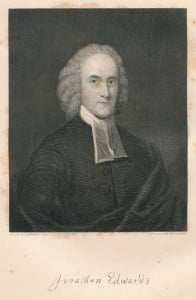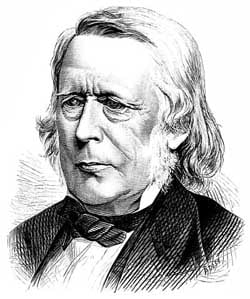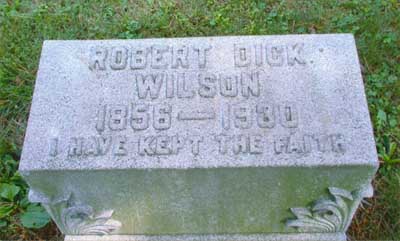“Our Presbyterian Heritage in Eastern Virginia”
A sermon delivered in Schauffler Hall on February 3, 1924, by the Rev. Edward Mack, D. D., LL.D.,
Professor of Old Testament Interpretation at the Union Theological Seminary, Richmond, VA
[excerpted from The Union Seminary Review, July, 1924].
“Freely ye have received, freely give.”
![Rev. Samuel Davies [3 November 1723 - 4 February 1761]](https://thisday.pcahistory.org/wp-content/uploads/2012/04/DaviesSamuel-231x300.jpg) Tomorrow, February 4th, is the anniversary of the death of Samuel Davies. One hundred and sixty-three years ago he died at Princeton at the age of thirty-six. His dust rests in the old Princeton Cemetery, by the side of his predecessor, Jonathan Edwards. The elaborate and merited inscription on his tomb tells the passerby of the grasp and range of his great intellect, his power as a preacher of the gospel, and his distinguished success as the head of Princeton College.
Tomorrow, February 4th, is the anniversary of the death of Samuel Davies. One hundred and sixty-three years ago he died at Princeton at the age of thirty-six. His dust rests in the old Princeton Cemetery, by the side of his predecessor, Jonathan Edwards. The elaborate and merited inscription on his tomb tells the passerby of the grasp and range of his great intellect, his power as a preacher of the gospel, and his distinguished success as the head of Princeton College.
About ten mile[s] northeast of Richmond, at Pole Green, in the depths of the country, there stood at one time an old meeting-house which was the heart and center of Samuel Davies’ greatest work. This old meeting-house was called “Morris’ Reading House.” On or near its site, in Hanover County, was built the first church for the ministry of Samuel Davies; and after its destruction the church was rebuilt on its present site, now known as Salem Church, one of the three in the group known as the Samuel Davies Group of Churches.
But why was it that Samuel Davies and his immediate predecessor, William Robinson, came to Hanover County? Those early Presbyterians were not Scotch-Irish from the North, or from over the Blue Ridge. Whence came they? This is one of the stirring stories of early Virginia, which must now be told in a few hurried chapters.
The first chapter carries us back to 1611, when Sir Thomas Dale came to the Virginia Colony to set that house in order.
In the early years loose government, ill health, fearful death rate and bad morals had demoralized the colony. That staunch Puritan, Dale, came to save the experiment on these western shores from apparent doom. It was his firm hand and sound principles that saved early Virginia to the Virginia Company and to us.
With Dale came “the Apostle of Virginia,” Alexander Whitaker, a Puritan minister. Whitaker left a comfortable and lucrative parish in Northern England to evangelize the Indians in Virginia, and to shepherd the scattered and straying colonists. His parish included Bermuda Hundred, on the south bank of the James River, about fifteen miles below Richmond, and Henrico, on the north bank, within nine or ten miles of Richmond. He was a man of deep piety and great learning. He organized his church on the Presbyterian plan, with minister and four elders. He held prayer meetings, and had theological exercises in the Governor’s house. He discarded the surplice, and emphasized not the sacramentarian element in the ministry, but preaching and teaching. He sent an appeal back to England for non-conformist ministers to come to Virginia, where conformity to the ritual of the Church of England was not required. In those early days perhaps half of the ministers in Virginia were Puritans or non-conformists.
One of Whitaker’s holy ambitions was the founding of a college in Virginia, where the children of colonists might be educated, and Indian boys also trained to evangelize America. Whitaker met a heroic and sacrificial death by drowning in 1617, and so failed to realize his dream. But by 1620 thousands of dollars had been collected for the college, a president appointed, and mechanics and farmers enlisted to build and till on these college lands. However, the Indian massacre of 1622 blasted these well-matured plans, and the college in Virginia was not realized until seventy years later at Williamsburg.
It is of greatest interest to us to know that this first American college was destined for our Henrico County, to be located about ten miles from Richmond, near Curl’s Neck, a Puritan College with Whitaker as its prophet and Patrick Copeland, a dissenting minister, as its first president. So was Henrico County anointed and consecrated with Presbyterian oil more than three hundred years ago.
The second chapter in our Presbyterian heritage in Virginia brings us down to 1641.
The southern bank of the James River was the special territory assigned to Puritans and non-conformists. Isle of Wight and Nansemond Counties were full of them. In 1641 Nansemond County was divided into three parishes, and a messenger was sent to New England, not old England, mark you, to secure three ministers. These three Puritan ministers, without orders from the Church of England, arrived in Nansemond in 1643. But meanwhile Sir William Berkeley had become the Royalist Governor of Virginia, and non-conformity was under the ban. Nevertheless, the three ministers taught and preached in private homes, and a great revival resulted, in which a multitude of Virginians were converted, and united with the Puritan, or Presbyterian body, among them such prominent men as Richard Bennett, first Commonwealth Governor of Virginia, under Cromwell, and General Daniel Gookin, to whose memory a tablet has been erected in the restored church at Jamestown. But the most remarkable of these converts was Thomas Harrison, the chaplain of Berkeley. And after the expulsion of the three New England ministers, Harrison became the pastor of their persecuted flock, afterwards going with them into exile. Harrison, fleeing from Berkeley into New England, said there were a thousand Puritan members in Virginia.
During the government of Cromwell these Puritans in Isle of Wight, Nansemond and Norfolk Counties must have enjoyed freedom of worship. For in the Norfolk court records there is found a call issued in 1656 by a dissenting church to a New England minister, Mr. Moore by name, in very much the same terms as the formula for the call of a minister in our Book of Church Order. But after the restoration of Charles II in 1662 and the return of Berkeley, our Puritan Presbyterians were harried and driven out of Virginia. Only [6] a goodly seed survived in Norfolk County. For this Puritan flock there were four licensed preaching stations in and around what is now the city of Norfolk. When Francis Makemie arrived in Virginia in 1684 he found that the non-conformist minister of this flock had died in the preceding year.
 With Francis Makemie we come to our third chapter in early Presbyterianism in Virginia.
With Francis Makemie we come to our third chapter in early Presbyterianism in Virginia.
He gathered the scattered Puritans of Norfolk County into a parish, which he served for a year, afterwards putting them into the hands of another Scotch-Irishman, Josias Mackie, who shepherded them until his death in 1716. But Makemie’s work was larger and wider than this. He organized Presbyterian churches in Accomac County and in the lower counties of Maryland, gathering into these churches the surviving and heroic Puritans of early Virginia days. He evangelized Delaware, and organized in Philadelphia in 1705 the first Presbytery in America. His name shines as an equal in that group of first magnitude stars: Whitaker, Bennett, Harrison.
We must pass hurriedly on to our fourth chapter in early Virginia Presbytery: the coming of Samuel Davies to Hanover County.
The Presbyterian revival in Hanover County in 1741 is a strange story. It did not come through Scotch settlers, nor through the Scotch-Irish who had begun to filter into the Valley of Virginia; but from within the communion of the Church of England. Since the days of tyrannical Governor Berkeley true piety had declined in the Virginia churches. Ministers were a sorry lot, often in contempt for ignorance and bad living. They were the tools of officials and rich land owners. In 1671 Governor Berkeley wrote; “We have forty-eight parishes and our ministers are well paid, and by my count would be better if they would pray oftener and preach less. But, as of all commodities, so, of this, the worst are sent to us, and we had few that we would boast of, since the persecution of Cromwell’s tyranny drove divers worthy “men hither. But I thank God that there are no free schools nor [7] printing, and I hope we shall not have these hundred years; for learning has brought disobedience, and heresy, and sects into the world, and printing has divulged them and libels against the government.”
The dissatisfied and hungry souls of all Virginia, particularly of Hanover County, absented themselves from such services. In Hanover they began to gather at the home of Joshua Morris to read among themselves what gospel literature they could procure, sermons for instance, such as Whitefield’s, and writings of Martin Luther. They willingly paid the fines assessed against them for absence from church services, if only they might together read and learn of Christ. Soon the home of Morris was too small for these seeking Hanoverians. Then he built at Pole Green “Morris’ Reading House,” where the great and growing company could meet for religious reading.
This growing outburst of dissent stirred the opposition of churchmen; Morris and other leaders were summoned to appear before the Governor and his council in Williamsburg. On the way to the capital the providence of God put a copy of the Westminster Confession of Faith into the hands of one member of the party. When they read it they found that it expressed with accuracy the views of God’s Word at which they in their meetings had already arrived. When the Governor asked them the name of the sect to which they belonged, their leader replied they did not know, but handing him the Confession of Faith, he said, “This book contains our faith.” Governor Gooch, a Scotchman, recognized the book as a Scotch edition of the Confession. “Why,” said he, “you men are Presbyterians. Now return to your homes and conduct yourselves properly, and no man shall molest you.”
The first Presbyterian preacher who came to this Hanover flock was William Robinson, whose four days of preaching in 1743 bore fruit in earnest throngs and many converts. Being a man of means, Robinson refused money for these days of preaching. But discovering a large roll of bills slipped into his saddle-bags without his knowledge, he dedicated it to the education of a young man for the ministry, in the hope that [8] he might come to Virginia. So it was that a poor, struggling young man, Samuel Davies, became the beneficiary of Virginia’s first gift for Ministerial Education, and after a few years, in 1747, this same Samuel Davies, at the age of twenty-three, came to these Presbyterians of Hanover as their first regular minister.
He was of poor and humble family. His educational opportunities were meager. From early life the grip of deadly tuberculosis was upon him. But his eleven years in Virginia mark the brightest period of equal extent of years in Virginia Presbyterianism. He was a lawyer, and won in the courts tolerance for his churches. He was a man of consuming missionary spirit, and preached regularly in six or seven counties. Byrd Church in Goochland and Olivet in New Kent grew up from his ministry. He was a great student of the Word and fed his flock from its pages. He was a wise organizer, and his work remains to this day. He was orator and poet and master of beautiful English, so that his sermons are read to this day as masterpieces of sublime thought and noble expression.
 On the death in 1758 of Jonathan Edwards, that mastermind of all American thinkers, Samuel Davies was elected to succeed him as President of Princeton College. In his two brief years as President he gave to that institution such literary and scholastic prestige as neither Edwards nor Burr had won for it. In 1761 this brief but wonderful life ceased on earth, and Samuel Davies entered into service on high.
On the death in 1758 of Jonathan Edwards, that mastermind of all American thinkers, Samuel Davies was elected to succeed him as President of Princeton College. In his two brief years as President he gave to that institution such literary and scholastic prestige as neither Edwards nor Burr had won for it. In 1761 this brief but wonderful life ceased on earth, and Samuel Davies entered into service on high.
This great Virginia Presbyterian challenges us, who live so near to the scene of his mighty labors, to follow in his train. Here is the model of a great preacher. Nothing less should satisfy us. Let me speak now to our rising ministry, here in such force within earshot almost of Samuel Davies’ majestic and surpassing sermons. How can we dare to be dull, drab, mediocre! How can we lift our faces to God and fellowmen if craven indolence consume our days! I have called to mind that the founders and leaders of our Virginia Presbyterianism were great scholars and great minds as well as noble souls. You dare be nothing less. There is a lazy notion abroad that any kind of an uneducated man may be a preacher, that mere fervor of spirit has abrogated the might of moral intelligence. But it is a sad mistake. Once indeed God used the jawbone of an ass to overwhelm a thousand men. But it is too much to require of Him a repetition of this miracle every day. When Samuel Davies was asked why, with all his wide learning and power of ready extemporaneous speech, he never entered the pulpit without a carefully prepared and written sermon, he replied that he could not ask God to bless a sermon which had not cost him the utmost labor of which he was capable. If a man has ventured to enter the ministry of souls without mental preparation, he must, like Samuel Davies, recoup his loss with the gain that is earned only by a life of unremitting mental toil.
Our last chapter tells of the after fruits of Samuel Davies’ life in Virginia. He was a patriot. While he was living in Hanover County, Braddock’s defeat in 1755 at Pittsburgh spread terror through Virginia. It was proposed to abandon all territory beyond the mountains to the French and the Indians. In this panic of souls it was Samuel Davies who counseled calm and courage. His sermon to them cheered the volunteers who went to the front from Hanover. Patrick Henry was under his ministry for eleven years, his family being members of the church. The younger statesman revered the preacher as the noblest orator of that time. When the great statesman found his country halting between two opinions, and stood like a Joshua in St. John’s Church calling for decision, as he said, “Choose ye chains and easy slavery if you will, but as for me, give me liberty or death,” while the lips of Henry moved, was it not the voice and soul of Davies that thrilled the ears of men and moved their hearts?
James Waddell, the missionary of the foothills of Virginia, lighted his torch from the fires that burned in the soul of Samuel Davies. I suppose the most notable instance in the life of this disciple of Samuel Davies is that which William Wirt records of Waddell. Wirt was passing the church near Gordonsville in which Waddell was preaching. Out of curiosity he stopped, entered and listened. It was a communion service. The aged blind preacher stood by the Lord’s table, melting to tears the hearts of his hearers with his eloquence, in his appeal uttering these immortal words: “Socrates died like a man; Jesus Christ died like a God.”
 The son-in-law of Waddell, Archibald Alexander, went from Virginia to found and build Princeton Seminary. Winstons, Henrys, Lacys, Rices in Hanover County became Presbyterians under the preaching of Samuel Davies. But what need I say more of our heritage and right as Presbyterians in Eastern Virginia! The question is not what Whitaker, Makemie and Davies did, but what shall we do about it?
The son-in-law of Waddell, Archibald Alexander, went from Virginia to found and build Princeton Seminary. Winstons, Henrys, Lacys, Rices in Hanover County became Presbyterians under the preaching of Samuel Davies. But what need I say more of our heritage and right as Presbyterians in Eastern Virginia! The question is not what Whitaker, Makemie and Davies did, but what shall we do about it?
Today a turning of Virginians to our faith has begun such as has never been known before at any one period. We do not watch a receding wave; the tide of opportunity is waxing to its flood. Six churches organized within eight months, and as many more in view, if we only have consecrated men to serve and consecrated means to equip! Some of these churches have risen where not a Presbyterian was supposed to be. Every county in Eastern Virginia is ready and waiting for us, if only we are ready to go and give to them. New highways are making new centers which have no churches. We have the men, we have the automobiles, the highways are building slowly. Let us fulfill and rewrite Isaiah’s words, “How beautiful upon the highways are the cars of those who preach good tidings, who publish peace, who say to our Zion in Virginia: ‘Behold your God.’ ” The heroic past challenges us, the needy present pleads with us, the awful future warns us that we deny not our faith nor fail in our trust.
Freely ye have received, freely give!
 James Henry Coffin was born in Williamsburg, Massachusetts, on September 6, 1806 and died on February 6, 1873, at the age of sixty-six. Orphaned as a young child, he was educated by his uncle, the Rev. Moses Hallock and later graduated from Amherst College in 1828. Exhibiting an independent, entrepreneurial character, he made a career of teaching and founded a successful manual labor school in Greenfield, MA. In 1837, he became principal of an academy in Ogdensburg, NY, and it was during this time that he began to develop an interest in meteorology, writing treatises on solar and lunar eclipses and on the moon. The Greylock Observatory on Saddle Mountain, at 3500 feet above sea level, was established under his guidance. For use at this observatory. Professor Coffin devised the first self-registering instrument ever constructed for determining the direction, force, velocity, and moisture of the winds. His life’s final work was was the manufacture of an improved instrument for this same purpose, for the National Astronomical Observatory at Buenos Ayres, Argentina.
James Henry Coffin was born in Williamsburg, Massachusetts, on September 6, 1806 and died on February 6, 1873, at the age of sixty-six. Orphaned as a young child, he was educated by his uncle, the Rev. Moses Hallock and later graduated from Amherst College in 1828. Exhibiting an independent, entrepreneurial character, he made a career of teaching and founded a successful manual labor school in Greenfield, MA. In 1837, he became principal of an academy in Ogdensburg, NY, and it was during this time that he began to develop an interest in meteorology, writing treatises on solar and lunar eclipses and on the moon. The Greylock Observatory on Saddle Mountain, at 3500 feet above sea level, was established under his guidance. For use at this observatory. Professor Coffin devised the first self-registering instrument ever constructed for determining the direction, force, velocity, and moisture of the winds. His life’s final work was was the manufacture of an improved instrument for this same purpose, for the National Astronomical Observatory at Buenos Ayres, Argentina.
![Rev. Gilbert Tennent [5 February 1703 – 23 July 1764]](https://thisday.pcahistory.org/wp-content/uploads/2013/02/tennentGilbert.jpg)


![Rev. Samuel Davies [3 November 1723 - 4 February 1761]](https://thisday.pcahistory.org/wp-content/uploads/2012/04/DaviesSamuel-231x300.jpg)


